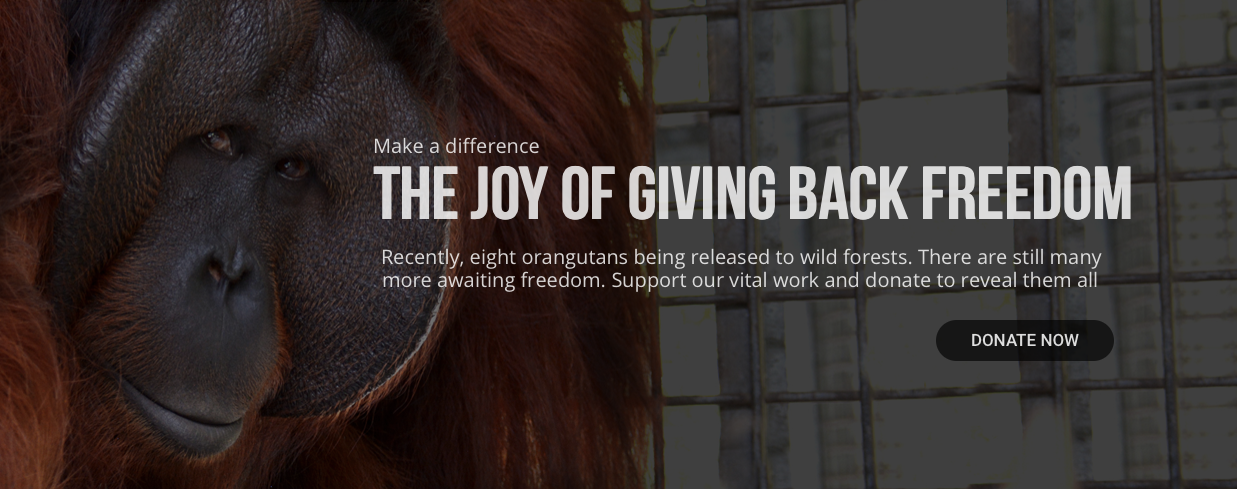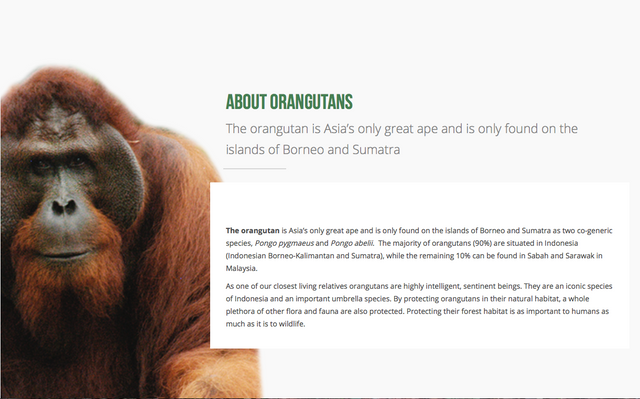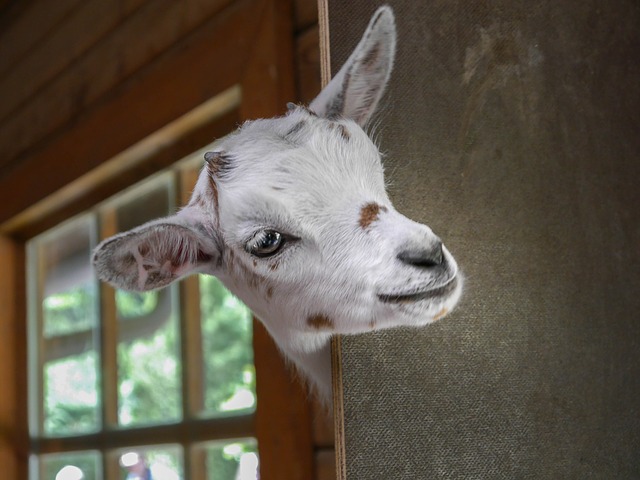VONATE for AID is back with a special CHRISTMAS donation Campaign! Donate now with ease, to help the Bornean Orangutan Foundation
VONATE for AID is back with a special Christmas donation Campaign!

Hello and welcome to another episode of VONATE FOR AID. This contribution is again dedicated to the orangutans and their steadily decreasing territory. All income will be donated to a relief organisation that I was able to visit this summer on borneo in malaysia. the relief organisation can only keep afloat through donations and income from tourists who are let in twice a day at feeding times.
Since I have watched the rangers, who look after the apes, with their own eyes, how they deal with the animals, I can say with pure certainty that these people have only the best for the orangutans in mind and give everything to increase the existence of the monkeys in the forests borneos again. And they have achieved this very successfully over the past decades.here is a short video, I took whilst feeding times. The orangutans are the real kings of the jungle!:
As you probably know, the biggest enemy of the orangutans is the human being. He has been tracking these monkey species for a long time, to domesticate them and to put on shows for tourists. This is fatal for the survival of these species and an unimaginable cruelty to animals. The orangutans are forced to perform very unnatural tricks, if they don't follow the staff they are punished by strong beatings, which is very painful.
The following video illustrate this cruel act very good:
In order for this animal cruelty to stop and for the animals to be brought back to where they are at home, the aid organizations of the world need donations. And this is exactly what we found together here today. With your vote today you have the opportunity to do something good. No matter whether small or large, every vote counts.
In this big christmas fund-raising campaign you can not only donate with the help of an upvote, you can also donate directly in the form of Bitcoin, Ethereum, Litecoin or any other cryptocurrency as long as it is to be exchanged on one of the big exchanges for bitcoin and subsequently for USD. All I need is a comment from you in which you specify the currency in which you want to make a donation, then I will immediately provide the required address. I will publish every donation that has been received in this way by editing the article or by commenting on it and thereby making it comprehensible to everyone.

We have probably made almost all the good profits made by the increasing mainstream being the cryptocurrencies. Why not simply donate a little bit in the form of love to animals in need?
I will do this for my part and donate 50$ in the form of SBD, which will be used for postpromotion at the same time.
To find out more about the charity, visit their website http://support.orangutan.or.id
In addition to extensive information about the way of life of the orangutans, a donation can also be made there. With a donation of $50 (which I have already made) can provide a general health check up for routine health screening orangutans. A donation of $100 can provide an orangutan feed for 30 days. I'm sure, together we can achieve this! Maybe far beyond!
The process of the donation campaign in short:
- Vonate for Aid is a helping program brought to life on Steemit to support aid organizations around the world.
- What you need to do is, just upvote this post if you want to support the Project and want to help animals threatend by extinction
- All earnings this posts gets, will be donated over to the aid organizations, in this case to the Borneo Orangutan Survival Foundation (http://orangutan.or.id/homepage)
- The average time period of collecting donations with this post will be 7 days, the overall duration will be until Christmas is over.
- to make the donation transparent, I am posting step by step images, to proof where the money is and how it will be transferred to them.
want to donate with another currency? Ask in the comments for a address for the specific cryptocurrency. Like gorillas, chimpanzees and bonobos, orangutans belong to the great apes. We humans share 96.5% of the genome with the orangutan. That's why we're so alike. In Indonesian Orang means "man" and Hutan means "forest" - orangutans are "forest people". They live only on the islands of Borneo and Sumatra in Southeast Asia. Each of these islands has its own species. A distinction is made between the Borneo orangutan (Pongo pygmaeus) and the Sumatran orangutan (Pongo abelii). On Borneo they are endangered with about 54,000 animals in the wild and on Sumatra with about 14,000 wild animals they are already threatened with extinction. A adult male can grow up to one and a half meters tall and weigh 100 kilograms, while a female weighs between 30 and 50 kilograms. Of all great apes, orangutans are the best climbers due to their anatomy alone. Their strong arms can reach a span of up to 2.25 meters. They are the largest and heaviest permanent tree dwellers in the world. Safe and effective climbing is therefore part of basic training for young orangutans. In the crowns of the jungle giants, orangutans find their predominantly plant-based food, such as leaves, fruits, bark and flowers, but also insects, honey, birds' eggs and smaller vertebrates are sometimes on their menu. In search of food, orangutans roam territories ranging from 90 (females) to 5,000 hectares (dominant males). However, they usually travel only a few kilometres per day. The intelligent animals prove an extraordinarily good memory: They remember the places where they have already found fruit and return to the ripening time. They also know and use medicinal plants, use branches to remove termites from their nests and use leaves as drinking containers and rain protection. In the evening they build a sleeping nest of branches and leaves at a height of about ten metres. The counting of such nests, which are usually only used once, is an important tool for observing orangutans outdoors. Orangutans do not live in larger social organizations. They can only be found in groups when they gather on trees that bear a lot of fruit. Only mother and child stay together for up to eight years. The territory of a dominant male includes the territories of several females. His dominance is demonstrated by the orangutan man with a widely audible call, the so-called long call. You can hear how that sounds downstairs. A wild orangutan usually grows about 40 years old. In the course of its life a female raises two to three young animals. Mother and child stay together for six to eight years. During this time, the offspring learns what they have to do to survive in the rainforest: safe climbing, finding the right food and building sleeping nests are just as much a part of it as social gangs with fellow species and learning what dangers one should avoid in the jungle. The greatest threat to orangutans is the destruction of their habitat. A hundred years ago, Sumatra and Borneo were 90 % covered with forest, today only 30 % of Sumatra and only half of Borneo is still forested. Since the 1990s, the rainforest has been cut down mainly for huge monocultures. More than 14 million hectares of Indonesia's land have already been converted into palm oil plantations - twice as many as ten years ago (as of 2015). By way of comparison, the total area of Germany is approximately 35 million hectares. An extension of the acreage for palm oil to 20 million hectares is planned. There's no room for orangutans to live. On the plantations they find no food and are hunted and often killed. The population of redheaded apes has shrunk by 91% since 1900. The rainforest in Sumatra and Borneo is sacrificed not only for palm oil production. The trade in tropical timber and the paper industry also cost orangutans more every day from their homeland. Indonesia is also one of the world's largest coal exporters, destroying vast areas of primeval forest for the mining industry. Although it is forbidden by law in Indonesia, orangutans are still being hunted, smuggled abroad, abused in brothels and, especially when they are still very young, kept as pets. BOS supports the Indonesian Forest Police in rescuing orangutans from illegal domestic animal husbandry or palm oil plantations. In two BOS stations in Borneo the injured, sick and orphaned orangutans are taken up and medically treated. Carefully, nurses then take care of the orphans, who are often severely traumatised. BOS makes orangutans fit for freedom. In the "forest kindergarten" and in the "forest school" the young animals learn everything that their mother would have taught them otherwise. The training of an orangutan child lasts up to eight years. Only then is it well prepared for release. BOS is poaching. If an orangutan is healthy and able to survive alone in the wild, it will be released as soon as possible. To this end, BOS has acquired the concessions for protected areas in which orangutans can live safely in freedom. Avoid palm oil. Look for the ingredients list when buying food. Palm oil or palm fat is the world's most widely used foodstuff, accounting for around 60 million tonnes per year. It is found in every second supermarket product: in convenience foods, sweets, margarine, spreads, candles, cosmetics, cleaning and washing agents and also in agro-diesel. About 85% of the palm oil used comes from Indonesia and Malaysia. Also contact dealers and manufacturers to find out why you continue to offer or manufacture products with palm oil. Demand still determines supply. Only use recycled paper. Buy painter's books, exercise books, toilet paper and other paper products only from 100% recycled paper (recognizable by the "Blue Angel" seal). No rainforest needs to be cleared for this purpose. Do not buy tropical wood. When purchasing furniture, picture frames and other wooden products, ask where the wood comes from. If the annual rings are missing, it can be tropical wood. Sources: klick
BTC Address: 1RjSmS1ZH2iJoeo3rNufoGneLNWPJKzn5
BCH Address: 1KGLNBAnZut4BUCMfM7NVfEwAa4ZuQi3WF
ETH Address: 0xFd1d45E90888a9c3539d7C0E7e807BD44c599e0b
LTC Address: LKHVCbCTUbYFhNUWTxUu2WYuf8rthEhozu
If there are any information missing in this summary, reply and ask me whatever you'd like to know!
The Following section contains some interesting information about the life of an orangutan, for those who want to know more about these wonderful animals:
General:
Way of living
Threat
Protection
Help
Merry Christmas to everyone, let's hope for a wonderful christmas story!

@ddot payed 1.0 SBD to @minnowbooster to buy a stealth upvote.

transaction-id ff87bf161919ec2085fc7178ae8047f22bc277cc
@stealthgoat
@ddot payed 1.94 SBD to @minnowbooster to buy a stealth upvote.

transaction-id 321867c0bb96fd85593c1b996de49529573410e4
@stealthgoat
@ddot payed 1.946 SBD to @minnowbooster to buy a stealth upvote.

transaction-id 891337f80db1a994952ac4d4b283c8b632530b65
@stealthgoat